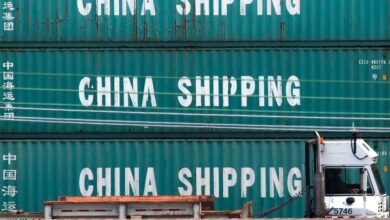New York leads 12 states suing to block Trump’s tariffs

A Dozen US States Unite to Challenge Trump’s Tariffs in Court
A coalition of twelve US states has come together to file a lawsuit aimed at blocking President Donald Trump’s controversial tariffs that have disrupted global trade patterns. Led by New York’s governor and attorney general, the lawsuit argues that the president overstepped his authority by imposing these tariffs without the approval of Congress.
The lawsuit, filed with the United States Court of International Trade, challenges Trump’s use of the International Emergency Economic Powers Act (IEEPA) to enact the levies. The states argue that the IEEPA does not grant the president the power to impose tariffs unilaterally, as he has done with countries like China, Mexico, and Canada.
The White House has defended Trump’s actions, citing national security concerns and the need to address trade imbalances. White House spokesman Kush Desai emphasized the administration’s commitment to using all available legal means to address national emergencies, including illegal migration and trade deficits.
The lawsuit contends that Trump’s use of the IEEPA has disrupted the constitutional order and caused economic chaos. It highlights the unprecedented nature of using the IEEPA to issue tariffs, as previous presidents have not utilized the law in this manner.
California has also filed a separate lawsuit challenging Trump’s tariffs, echoing the argument that the president lacks the authority to impose these levies under the IEEPA. Multiple legal challenges have been mounted against Trump’s tariff policies, raising questions about the extent of his presidential powers in this area.
Trump’s tariffs have sparked a global trade standoff, particularly with China, where a 145% tariff on certain goods has escalated tensions. Despite the ongoing trade dispute, Trump has expressed optimism about reaching a deal with China and has hinted at potential tariff reductions in the future.
The White House has also imposed tariffs on goods from Mexico and Canada, further complicating trade relations with key US allies. The outcome of these legal challenges will have significant implications for the future of US trade policy and the balance of power between the executive and legislative branches.





